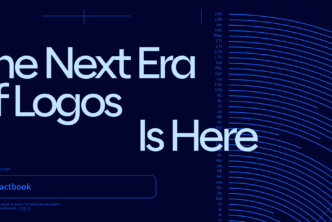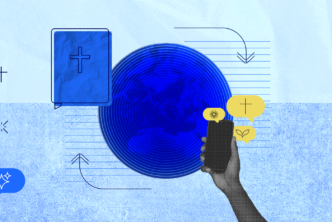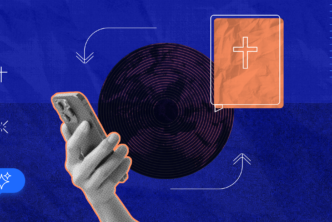Recently, a group of my friends were discussing how they divided up household tasks. One said that after she bought a Roomba, her husband responded, “Hey, no fair! I can’t buy something to automate my chores!” We all laughed. But the conversation triggered a question in my mind about what drives us to automate certain tasks and what that says about how we think about work and time.
As AI enables more devices to become more capable, I’m led to reconsider another favorite question that I often ask Christian audiences: What technology do you think will—or won’t—be in heaven? More specifically, why (or why not) would there be Roombas in heaven? And what does our answer tell us about our relationships today with technology, work, and time?
A rebooted vision of heaven: new creation
Stepping back a moment from the question of Roombas, let’s consider our view of “heaven.”
Like many evangelicals, I grew up hearing that my sin destined me to hell, but that if I believed in Jesus, then I would go to heaven. Avoiding hell sounded great, but I secretly wondered about the heaven part. Would heaven really be a good place, I wondered, if some of my favorite things (like my Nintendo) wouldn’t be there?
Would heaven really be a good place, I wondered, if some of my favorite things (like my Nintendo) wouldn’t be there?
As I matured theologically, I began to realize that the picture I had of a heaven with clouds and pearly gates was not particularly biblical. When I learned that the story of Scripture does not end with a “game over” for earth but with resurrection (Job 19:25–27; Ps 71:20; 1 Cor 15:12–22) and new creation (Isa 65:17; Rom 8:18–21), a new earth with a heavenly city (Heb 11:16; Rev 21:2), it gave me hope that God cared about normal human things like roads, trumpets, and gates that open up to tables of food and drink (Rev 19:7–10). Perhaps my Nintendo 64 wasn’t the highest of human goods, but this new earth would be a profoundly human place, restoring the goodness of God’s original creation as well as our task to rule over it (Gen 1:28) through cultivating and keeping it (Gen 2:15).
Heavenly technology?
Once I realized that our final destination is not going up to heaven, but that a heavenly city would come down to a renewed creation (see Rev 21:10), I began to wonder what other tools, machines, and devices might be in that new city.
We should first admit that we don’t know exactly what the new creation and our resurrected bodies will be like. As mentioned above, Scripture consistently portrays the new creation with the physical imagery of an earth with a city, with a wonderful array of physical materials (Rev 21:18–21), recalling the list of items in the garden (Gen 2:11–12). And yet there are hints that the new creation will differ in wonderful ways from this world. The glory of the Lamb means there is no need for a sun (Rev 21:23), and our spirit-empowered bodies will be gloriously imperishable (1 Cor 15:42), powerful (1 Cor 15:43), and immortal (1 Cor 15:53–54).
Paul promises that our bodies will be made like Christ’s “glorious body” (Phil 3:21) which the Gospels portray as being able to appear within a building (John 20:19, 26) and disappear (Luke 24:31) at will. At the same time, Mary mistook his resurrected body for a gardener (John 20:15), and the effects of the crucifixion on his body could be seen and touched (John 20:27). Perhaps most interesting of all is that the resurrected Jesus made a fire on which he cooked fish (John 21:7–14).
Jesus’s post-resurrection appearances and activities seem to point to something beyond our current physical world, but not something that leaves it entirely behind, either. We can appropriately call this a “supernatural” renewal of all things (Rom 8:19–23), where even human-created tools will not be destroyed, but transformed for human flourishing (Isa 2:4).
Jesus’s post-resurrection appearances and activities seem to point to something beyond our current physical world, but not something that leaves it entirely behind, either.
With this supernatural new creation in mind, I sometimes ask seminary students and church audiences to imagine what kinds of tools we might use there. I find that many have no trouble conceiving of things like utensils for eating or houses for dwelling. They also aren’t afraid to say what won’t be there. For example, if God promises to wipe away every tear and eliminate the sting of death (Rev 21:4), it would seem that medical equipment would be unnecessary. Hallelujah, if so!
But what about communication devices? I find that most audiences wince at the thought of having “phones” in the eschaton, for instance. But I often wonder if that is because phones are truly too banal and “natural” (1 Cor 15:46) for a new earth, or because we lack the will and imagination to use our phones today in a way that honors God? Similarly, for many of us, it’s hard to imagine a place in the new creation for artificial intelligence, whether on a screen or in the form of a robot. Again, is this because there is no place for such creations in a supernatural world, or because our sense of the goodness of work has been warped?
Why do Roombas exist?
All of this finally enables us to ask why humanity created Roombas in the first place. There are actually two questions here:
- What is the problem we are trying to solve?
- Why do we need a Roomba and not something else to solve it?
This might seem too obvious to mention, but the problem we are trying to solve is unwanted dust and other things we call “debris” on the floor. These various particles can arrive there from our own neglect as we drop things throughout the day, through the basic laws of gravity and friction, and from the decay of things that cannot renew themselves.
One could answer our Roomba question (“Will they be in heaven?”) by pointing to specific verses such as the previously mentioned image of the new city having no need for a sun (Rev 21:23), and argue that perhaps there will be no dirt that needs to be cleaned, either. I think that’s possible. However, it’s difficult to know if the eschatological portraits should be interpreted so literally, or if they are offering more of an impression of the wonder of new creation. But even if we take the idea of no sun literally, we also recall, again, that the resurrected Jesus cooked fish (John 21:9–13) and that we are promised wonderful feasting in the new city (Rev 19:6–9), which would seem to hint that some form of cleanup would be needed.
Again, our goal here is not to provide a one-to-one interpretation of every eschatological image, but to recapture the original goodness of working with tools and show that, even in the new city, it’s possible there might still be a need for things that assist in the work of cleaning.
Introducing toil
This leads us to the second question: Why do we want Roombas to do our cleaning?
Cleaning with our hands is nearly impossible, so humans have long used our God-given creativity to make tools like brooms and dustpans, and more recently portable vacuums, that make cleanup possible.
Why, then, do we we want a robot to clean our floors? I think there are two primary reasons: toil and time.
The creation account in Genesis portrays work as a fundamental part of human design. God himself models a pattern of work and rest in the six days of creation and a seventh day of rest. He then asks humans “to cultivate and keep” the garden he gave us (Gen 2:15).
However, the fall changed the experience of work (Gen 3:17–19), introducing toil and pain to much of what we do. In our fallen world, the Bible continues to affirm the goodness and necessity of work (Eccl 5:12; Prov 19:15; Eph 4:28; 1 Thess 4:11). Nonetheless, we now experience certain tasks as dehumanizing, brutal, or just difficult. If you’ve ever been stuck by thorns when picking blackberries, been burned trying to fix an engine, or simply worked a job with a repetitive, monotonous task, you know why humans invent machines that allow laborers to avoid painful, dangerous, or boring work.
But this makes me wonder: Should sweeping the floor truly be considered toil? Is this kind of work so menial and beneath me that I need to completely turn the task over to a robot? Dangerous work deep within a mine, eighteen-hour shifts on a farm, manually editing thousands of database records—those seem like toil. But it seems that the more intelligent our devices become, the more likely we are to view almost any form of work as toil.
The more intelligent our devices become, the more likely we are to view almost any form of work as toil. However, sometimes uncomfortable activities are the very things that form us into the kinds of people we want to be.
However, sometimes uncomfortable activities like running, memorizing, and forgiving are the very things that form us into the kinds of people we want to be. Being able to run a marathon is a very different thing from knowing how to look up the length of a marathon, and being patient with a difficult person is different from searching for verses on patience.
One hopes that in the eschaton, toilsome work will go away, but also that our attitudes and orientation toward work will be redeemed and reformed such that no task, however menial it might seem in this world, would ever be deemed beneath us. Perhaps being conformed to our Savior’s “glorious body” (Phil 3:21) involves a redeemed way of valuing servanthood, working not to get ahead but to the glory of God and for the love of our neighbors.
Time and death
Some of us like our Roombas, not because we think that sweeping the floor a few times a week is toil, but because we believe that it does something that we don’t always have time to do. In other words, we think of a well-scheduled Roomba as something that “saves time.”
Though time itself is part of our creatureliness, concepts like “saving time” is more deeply connected to the fall then we might think. Sin introduced death into the world, and death is what makes time important. God gave us a pattern of work and rest, but before sin and death, Adam and Eve had an infinite number of weeks, making the length of time that a task takes less insignificant than it might be to us.
In a world with death constantly looming on the horizon, the Scriptures often remind us to use our time well. The Proverbs warn against “A little sleep, a little slumber” (Prov 6:10), and Paul tells us to make “the best use of the time, because the days are evil” (Eph 5:16–17 ESV). The young often feel that they have “all the time in the world,” while the middle aged feel a sense of urgency to accomplish all that they can and avoid “wasting time.” We tell young parents, “The nights are long, but the years are short,” urging them not to let those precious moments pass away.
In response to the fleeting nature of time, we create devices that we believe will “give me more time.” Yet, while our robots and AI tools often do shorten the length of a task, it’s not always clear what we do with that additional time. Do we truly rest? Do we use it to cultivate a skill that may take a decade to master? Or do we fill that void with more accomplishments, entertainment, or leisure that leaves us devoid of that for which we truly longed?
While our robots and AI tools often do shorten the length of a task, it’s not always clear what we do with that additional time.
Now consider an endless eternity in a new heavens and new earth—in that universe where time has no end, does the idea of “saving time” become irrelevant? If sweeping still needs to be done, would the length of time it takes matter to us? To put it in larger, more imaginative terms: If God’s command to fill the earth extends to the entire universe, who cares how long it takes to reach another galaxy?
Work in an AI world
I have tried to argue that, in the eschaton, work will never be toil and time will never be limited, which may affect the kinds of things we create and use. If no work feels menial and no task is too long, perhaps this means we won’t desire to create machines to do our work for us. We’ll still need tools that help us accomplish our work, but we might consider devices that completely replace work to be unnecessary or even unseemly.
However, in this life, work is often toil, and time is always limited, so we will continue making tools that we hope make life a little easier and give us back a few more moments.
At the same time, I’ve also tried to show that, in all our striving to “save time,” we sometimes devalue work itself, including both its inherent goodness and its ability to positively shape our bodies and minds. We also tend to resist God’s pattern of work and rest, preferring instead to achieve and accumulate, often robbing ourselves of joy and connection. In world of rapidly advancing AI and robotic workers, this temptation and confusion will only increase, requiring greater wisdom and self control.
In the novel The Brothers Karamazov, the devil is described as not having a watch, because Dostoevsky wanted to emphasize that Satan had no real place in human history or in the age to come. He had no work to do and no real body in which to do it. But God has chosen to place us, his image bearers, into creation and the flow of time.
Though sin and death are present realities, we cling to the hope that one day death will be defeated (Isa 25:8; 1 Cor 15:26). In the meantime, we pray like the psalmist that God would “teach us to number our days” (Ps 90:12) and help us to use the “talents” (Matt 25:14–30) we’ve been given. Let’s recognize good work, make true rest a priority, and wisely create and use tools that assist us in doing so.
Continue reflecting on AI, work, and time with these recommended resources from John Dyer
- “Will Smartphones Last for Eternity?” by Adam Graber offers eight criteria for how new creation tools (what he calls “Eternal Tech”) might be rightly oriented between God, humanity, and creation.
- “Jesus’s Resurrection and Ours According to Paul the Apostle” by James Ware explores the debate around interpreting Paul’s teaching about resurrected bodies in 1 Corinthians 15.
- “Generative Artificial Intelligence in Theological Education” by John Dyer explores how education should be a formative process and the role AI should and should not play in that.
Additional Word by Word articles on AI
- From Data to Discernment: Why Can’t Replace Cultivating of Wisdom by Brett McCracken
- How Should We Think about AI & Bible Study? by Mark Barnes
- A Theology of AI by a Bible Software Nerd by Mark Ward





